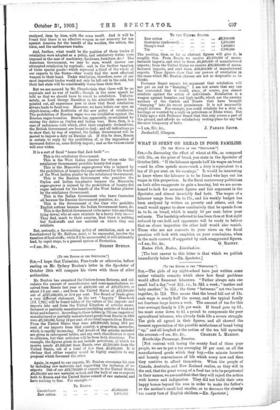ITO THE EDITOR OP TEE "Sescrrros."1 SIR,—The girls of my
night-school have just written some rather valuable remarks which show how fiscal problems would affect Somerset labourers. " Father always eats one small loaf a day,"—at 21d., i.e., ls. 3td. a week ; "mother and baby another," ls. the three " between " eat two loaves together, 2s. 71d. This means that the bread bill out of lls. cash wage is nearly half the money, and the typical family eat fourteen large loaves a week. The amount of tea for this (our average) family is lb. per week. If bread goes up ld., tea must come down to 4d. a pound to compensate the poor agricultural labourer, who already finds life a severe struggle. The girls all agreed in their figures, and all showed the keenest appreciation of the possible misfortune of bread being " up," and all laughed at the notion of the tea bill squaring
the account.—I am, Sir, &c, CHARLES L. MARSON. Hambt idge Parsonage, Taunton.
[Not content with taxing the scanty food of these poor people, we are to put a tax averaging 10 per cent. on all the manufactured goods which they buy,—the minute luxuries and homely conveniences of life which every now and then they contrive to afford themselves. When the people of Canada, Australia, and New Zealand realise, as they will in the end, that the great wrong of a food tax is to be perpetrated in their names, we are confident that they will reject the notion with horror and indignation. They did not build their own happy homes beyond the seas in order to make the father's or the mother's small loaf smaller, or to decrease the already too scanty fare of English children.—En. Spectator.]


















































 Previous page
Previous page